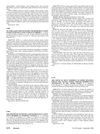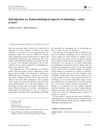 4 citations,
December 2021 in “Archivio italiano di urologia andrologia”
4 citations,
December 2021 in “Archivio italiano di urologia andrologia” Certain drugs, especially antiandrogens and spironolactone, significantly increase the risk of gynecomastia.
 4 citations,
February 2019 in “Biological Trace Element Research”
4 citations,
February 2019 in “Biological Trace Element Research” Chromium salts may help with insulin sensitivity in PCOS, but more research is needed to confirm their overall effectiveness and safety.
 4 citations,
December 2014 in “PubMed”
4 citations,
December 2014 in “PubMed” Pre-operative hormone treatment for hypospadias surgery might improve outcomes, but more research is needed to confirm.
 3 citations,
January 2018 in “International Journal of Advances in Medicine”
3 citations,
January 2018 in “International Journal of Advances in Medicine” The most common skin problems in polycystic ovarian disease are hirsutism and acne, and managing these symptoms is key for treatment.
 3 citations,
May 2011 in “Journal of Obstetrics and Gynaecology”
3 citations,
May 2011 in “Journal of Obstetrics and Gynaecology” A woman's pelvic pain and bleeding led to finding and successfully treating a rare benign tumor in her reproductive system.
 3 citations,
January 1992 in “Gynecological Endocrinology”
3 citations,
January 1992 in “Gynecological Endocrinology” 3α, 17β-androstanediol-glucuronide is not a useful marker for androgen excess but may help monitor certain treatments.
3 citations,
June 2015 in “CRC Press eBooks” Male pattern hair loss affects up to 80% of men due to genetics and hormone sensitivity.
2 citations,
September 2022 in “Drug Delivery” The microneedle system effectively promotes hair growth for treating androgenic alopecia.
2 citations,
August 2022 in “Middle East Fertility Society Journal” The new rodent model successfully mimics non-lean human PCOS symptoms.
 2 citations,
August 2020 in “JCRPE”
2 citations,
August 2020 in “JCRPE” A girl with Denys-Drash syndrome was misdiagnosed due to biotin affecting her hormone test results.
 2 citations,
April 2019 in “Медицинский совет”
2 citations,
April 2019 in “Медицинский совет” Combined oral contraceptives improve skin, hormone levels, and quality of life in women with PCOS.
 2 citations,
January 2019 in “Biomedical Journal of Scientific and Technical Research”
2 citations,
January 2019 in “Biomedical Journal of Scientific and Technical Research” Saw palmetto in hair products might reduce hair loss but can cause side effects.
 2 citations,
January 2014 in “International Journal of Endocrinology”
2 citations,
January 2014 in “International Journal of Endocrinology” Women with a certain type of tumor had higher levels of pregnancy hormone and male hormones, which decreased after treatment.
 2 citations,
January 2011 in “Andrologia”
2 citations,
January 2011 in “Andrologia” Flutamide and a new synthetic steroid affected brain and prostate chemicals and showed potential for treating androgen-related conditions and epilepsy.
 2 citations,
September 2008 in “Fertility and Sterility”
2 citations,
September 2008 in “Fertility and Sterility” Women with PCOS and higher BMI, especially those with morbid obesity, are at greater risk for depression.
 2 citations,
December 2003
2 citations,
December 2003 Saw palmetto is an effective natural treatment for hair loss with minimal side effects.
2 citations,
September 1971 in “Metabolism, clinical and experimental” Dihydrotestosterone has a reduced effect on muscle-building in people with testicular feminization syndrome, especially after their gonads are removed.
 2 citations,
March 2015 in “World journal of acupuncture-moxibustion”
2 citations,
March 2015 in “World journal of acupuncture-moxibustion” Traditional Chinese medicine techniques like catgut embedment, moxibustion, and bloodletting showed better results for treating hair loss than the drug finasteride.
 1 citations,
November 2023 in “Journal of ovarian research”
1 citations,
November 2023 in “Journal of ovarian research” Agaricus subrufescens improves ovarian function and biochemical health in rats with PCOS.
 1 citations,
September 2023 in “JCEM case reports”
1 citations,
September 2023 in “JCEM case reports” GnRH analogues are effective for diagnosing and treating female androgen excess, offering a non-surgical option.
 1 citations,
August 2023 in “Andrology”
1 citations,
August 2023 in “Andrology” Finasteride changes hormone levels and certain proteins in rats, but these effects can be reversed after stopping the drug.
 1 citations,
March 2022 in “Daehanhanuihakoeji”
1 citations,
March 2022 in “Daehanhanuihakoeji” Artemisia sieversiana extract may help prevent hair loss and promote hair growth.
 1 citations,
January 2022 in “Transgender health”
1 citations,
January 2022 in “Transgender health” Hormone therapy in transgender individuals can increase acne and affect hair growth and loss.
1 citations,
January 2020 in “Bioscience Reports” Long-term use of finasteride in women can cause hormonal changes, DNA damage, and menstrual issues.
 1 citations,
December 2018 in “Journal of Cosmetic Dermatology”
1 citations,
December 2018 in “Journal of Cosmetic Dermatology” Men with thinner hair from genetic hair loss may be more likely to have an enlarged prostate.
 1 citations,
October 2018 in “International Journal of Research in Dermatology”
1 citations,
October 2018 in “International Journal of Research in Dermatology” Most women with excessive hair growth in South India have hirsutism without a known cause, with common facial hair growth and some showing hormonal imbalances and polycystic ovaries.
 1 citations,
September 2018 in “Australasian Journal of Dermatology”
1 citations,
September 2018 in “Australasian Journal of Dermatology” A boy with GAPO syndrome had hair loss similar to male pattern baldness without hormone issues, possibly due to skin or blood vessel problems.
 1 citations,
January 2016 in “Journal of Microbial & Biochemical Technology”
1 citations,
January 2016 in “Journal of Microbial & Biochemical Technology” The Free Androgen Index (FAI) is the best indicator of early hair loss in men before age 30.
 1 citations,
September 2015 in “Reviews in Endocrine and Metabolic Disorders”
1 citations,
September 2015 in “Reviews in Endocrine and Metabolic Disorders” The document discusses new insights into how hormones affect male sexual health and related conditions.
 1 citations,
July 2015 in “AACE clinical case reports”
1 citations,
July 2015 in “AACE clinical case reports” Removing both ovaries treated the woman's excess male hormone symptoms.

























